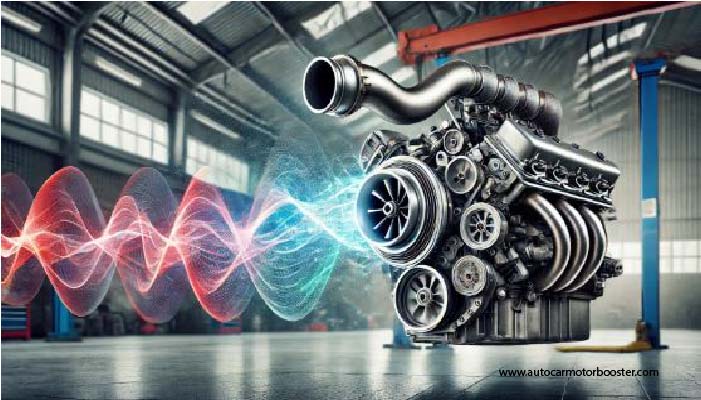Boost, in automotive terms, refers to the process of increasing the amount of air and fuel mixture entering the engine to enhance its performance. The addition of boost can be achieved through the use of superchargers or turbochargers, both of which force more air into the engine’s combustion chamber, thus improving engine efficiency and power output. However, a lesser-known effect of boost is its impact on engine sound quality.
The Science Behind Boost and Engine Sound
The relationship between boost and engine sound quality is complex. To understand how boost affects sound, we first need to look at what influences engine noise. Several factors contribute to the distinctive sound of an engine, such as the type of fuel used, exhaust system design, engine size, and internal components like valves and pistons. When boost is applied, the engine dynamics change in several ways that can either enhance or dampen the sound quality.
1. Increased Pressure and Higher RPMs
When boost is introduced into the engine, it increases the pressure within the combustion chamber. This pressure causes the engine to generate more power at higher revolutions per minute (RPM). As the RPMs increase, so does the frequency of exhaust gas emissions. Higher RPMs lead to a sharper, more aggressive engine note. This is especially noticeable in turbocharged engines, where the turbo’s spinning speed and airflow create a distinct sound, often described as a whistle or a “turbo whoosh.”
2. Sound of a Turbocharged Engine
A turbocharged engine, in particular, exhibits a unique sound profile. As the turbocharger increases air pressure, it compresses the air before sending it into the combustion chamber. The process of compressing air and forcing it through the turbocharger blades creates a high-pitched whine. This sound, often referred to as the “turbo whistle,” is beloved by car enthusiasts who enjoy the mechanical, almost sci-fi noise it generates. While the “whoosh” sound is more noticeable during acceleration or when the engine is under load, the sound quality is generally sharper and more distinct when boost is used.
3. Exhaust and Resonance
Exhaust systems play a pivotal role in shaping the overall sound of an engine. The exhaust note, which is the sound the engine produces as exhaust gases exit the engine, changes dramatically when boost is applied. The increase in exhaust pressure caused by forced induction can amplify the exhaust sound. Additionally, the engine’s resonance frequency may shift with higher boost, changing the pitch and tone of the engine’s exhaust. Some car manufacturers enhance this effect by modifying the exhaust system to produce a more aggressive sound, which becomes even more prominent at higher boost levels.
4. Impact of Boost on Engine Tone
Boost can also affect the engine’s overall tone. Normally, an engine with a naturally aspirated (NA) setup has a relatively consistent tone, with a smooth idle and linear acceleration. However, once boost is applied, the engine tone becomes more dynamic, often shifting from a deep growl to a sharp, high-pitched whine, and sometimes even a pop or crackle during deceleration. These sounds are caused by the increased air and fuel mixture and the changing exhaust dynamics, which produce a more complex and aggressive tone.
5. The Impact of Boost on Sound Quality: Is It Positive or Negative?
The effect of boost on sound quality can be both positive and negative, depending on the type of sound desired. For performance enthusiasts, the addition of boost is often seen as a positive development, as it increases engine power and results in a more exciting, aggressive sound. However, some drivers may find the increase in noise unpleasant, particularly when the sound becomes too sharp or overbearing. Additionally, certain performance enhancements, such as after-market blow-off valves, can introduce a high-pitched hiss that some may find excessive.
Conclusion
In conclusion, boost undeniably has a significant impact on engine sound quality. While it can enhance the engine’s sound by making it sharper, more aggressive, and dynamic, it also introduces challenges in terms of managing unwanted noise. Whether the sound produced by a boosted engine is considered an enhancement or a distraction depends on the preferences of the driver. For those who appreciate a more aggressive, high-performance sound, boost provides a thrilling auditory experience. For others, managing the sound quality of a boosted engine may involve adjusting exhaust systems or even adding sound dampening components to reduce unwanted noise.
FAQs
- What is boost in an engine?
Boost refers to the increased pressure in the engine’s intake manifold, achieved through the use of a supercharger or turbocharger. This allows more air and fuel into the engine, resulting in increased power. - How does a turbocharged engine affect sound quality?
A turbocharged engine produces a distinctive “turbo whistle” or “whoosh” sound as the turbo forces compressed air into the engine. This sound becomes more noticeable during acceleration or when the engine is under load. - Does boost increase exhaust noise?
Yes, the increased pressure and air flow caused by boost can amplify the exhaust noise. The engine’s resonance frequency shifts, producing a louder and more aggressive exhaust note. - Can boost affect engine tone?
Yes, boost can change the engine’s tone. While a naturally aspirated engine has a smooth and consistent tone, a boosted engine may have a more dynamic sound, including deeper growls, whines, or pops and crackles. - Is it possible to reduce the noise from a boosted engine?
Yes, sound can be reduced using aftermarket components such as quieter exhaust systems or sound dampening materials. Some drivers prefer to enhance the sound with performance exhaust systems, while others may want to reduce excessive noise.
If Like This Article Visit Our Website. Collect From Wekiapedia
